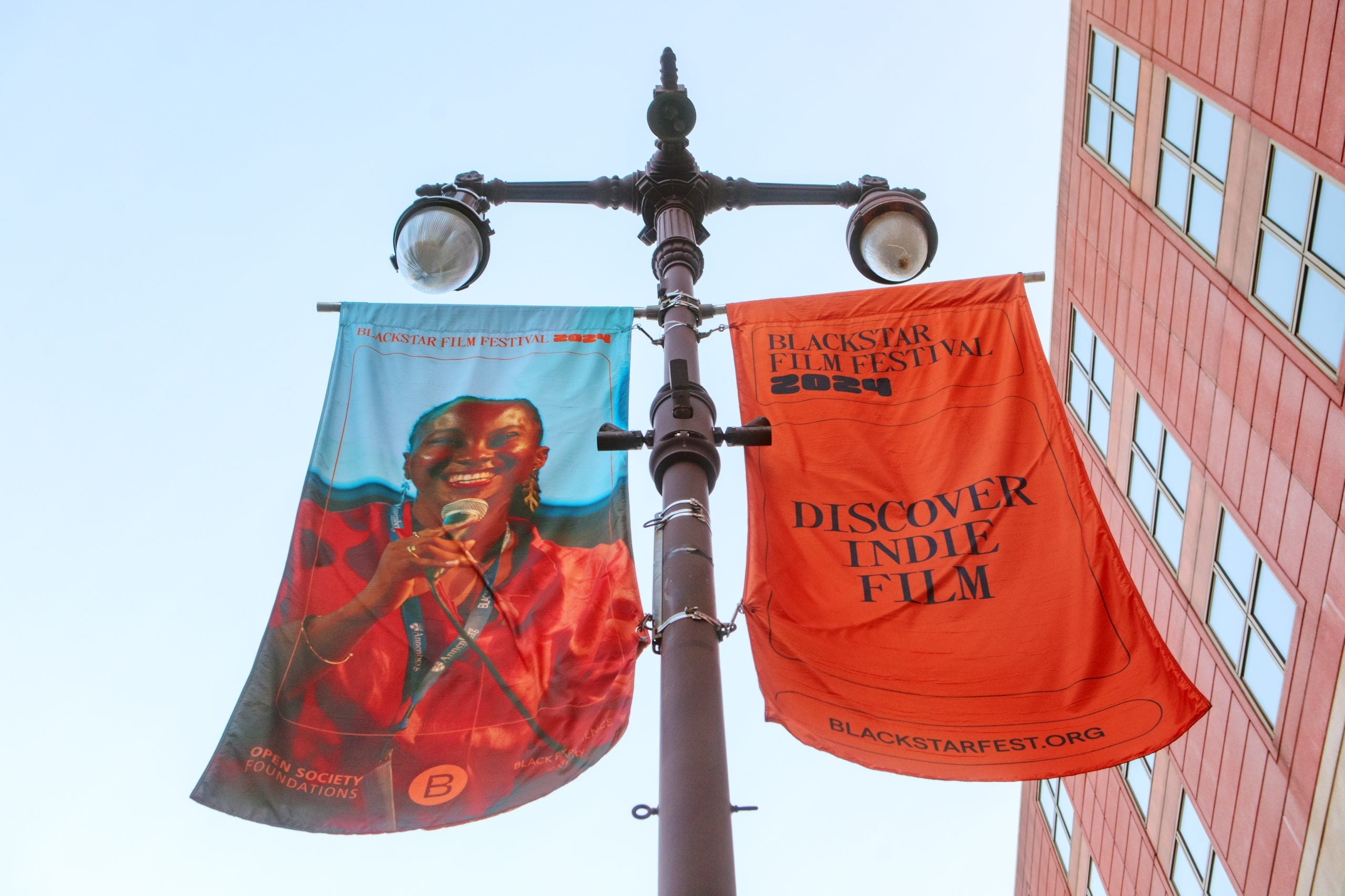Since its inception in 2012, the BlackStar Film Festival has grown into a marquee platform for showcasing some of the world’s most creative and influential Black, Brown, and Indigenous voices in filmmaking and the visual arts. Earlier this month, the event commenced once again in its home of Philadelphia with a vibrant mix of independent film screenings, live and virtual programming, artist panels, and exciting activities for visitors and locals alike.
This year’s festival took place in-person at several venues across the city, including the Kimmel Center for the Performing Arts and the Suzanne Roberts Theatre, and was also accessible digitally, which ensured a wide reach and inclusive experience. Films such as Songs From The Hole and Boat People won Juried Awards, while Burnt Milk, A Symphony of Lights, and others took home Audience Awards. Attendees were able to view a diverse lineup of films that not only challenged, inspired, and entertained, but also reflected the rich tapestry of global experiences from people of color.
“When I started the festival, I didn’t realize that it was going to be an annual event, and I was mostly interested in seeing films that I knew existed in the world but hadn’t been shown in Philadelphia,” says Maori Holmes, Chief Executive & Artistic Officer of BlackStar Projects. “I was also interested in a specific kind of film, mostly experimental, largely made by independent filmmakers and wanting to put them together in a way that would put artistic films next to social justice documentaries and next to some repertory work—so it was kind of like a curatorial project for me.”

As a visionary filmmaker, writer, and curator, Holmes’ dedication to creating a nurturing space for underrepresented artists has positioned BlackStar as more than just a film festival—it is a movement that celebrates and amplifies marginalized voices. This year’s festival built upon that legacy, providing a dynamic platform for filmmakers and artists to connect with audiences and each other, fostering a community that thrives on creativity, dialogue, and a shared passion for storytelling.
In celebration of the festival’s 13th year, Holmes sat down with ESSENCE to discuss BSFF’s growth, its impact on the creative community, the influence that the city of Philadelphia has had on its progression, and much more.
ESSENCE: Can you speak to me about the creation of the BlackStar Film Festival and why you decided to create this festival for Black creators?
Maori Karmael Holmes: Well, just a small point. The festival is for people of color. We initially started off as an African diaspora festival for Black people specifically, but it’s grown to be for all people of color now.
With it being over a decade since the BlackStar Film Festival began, how do you feel about how much it’s grown throughout the years?
It’s a world of difference. From 2012 to 2019, I was the Chief Programmer. I was all the things—the fundraiser, the publicist—I did all the things for the festival. And then we launched BlackStar Projects as a parent organization in January of 2020. And once we did that, we then rolled out other programs. So we now have a journal, we have a filmmaker lab, we do a filmmaker seminar, we have fellowship programs, we do exhibitions, and we do screenings year round across the country. And so that is a lot of different work that I wasn’t anticipating in addition to the festival growing, which as you mentioned, it’s much bigger than it was that first year. I mean, quite literally, the budget and the attendees is almost tenfold. So yeah, it’s a very different reality.
I’ve always enjoyed when a festival is attached to a certain location—similar to the ESSENCE Festival and New Orleans. Philadelphia is such a big part of the BlackStar Film Festival, can you give me your thoughts on why you think “The City of Brotherly Love” makes this particular festival special?
It’s interesting because I joke with a lot of my team that it wasn’t on purpose that the festival is here in Philadelphia. It was because I lived here that the festival is here. But Philadelphia and its character is a part of how the festival operates for sure. And what I think one of the basic things that’s really great about it is that when people come to the city for the festival, we have their attention for four days. Especially industry people. They’re not running off to sneak in a meeting or go do some other activity somewhere by and large, we have their attention.
So for the first several years that created this atmosphere, which is why people call it a family reunion because all of the filmmakers and all of the attendees were intermixing and colliding and just really having their attention. So that I think is really great. I’m not from here, and so some of the things that I’ve learned, even just because of the festival, but also over time is just thinking about the legacy of independence movements for Black people, Black and brown folks in Philadelphia. I think that definitely touches on the festival. Also, there are a number of artists that are from here and we didn’t always know that, but now it’s uncovered.
And also thinking about the history of Philly music, which is one of the things that I think makes it similar to New Orleans. Everyone’s music directors come from Philly and the legacy of The Sound of Philadelphia and thinking about Black Lily days and Neo Soul and all the record labels that produced the Fugees, Digable Planets and Zhané. It’s like all these things we’re touching in Philly and I think people don’t realize it because they just assume things are from New York. But it’s very interesting how much has actually originated here.
Earlier in the conversation, you spoke about how in 2019 you kind of let go of some of the reins for the festival. And I know as a leader or a business owner, sometimes that may be difficult depending on your personality. How challenging was delegating different duties to other people or was that a seamless transition for you?
No, it was very difficult. 2020 was the first festival that I did not program myself. And that happened in a very pragmatic way because of the pandemic and being on screens all day. I did not have the energy that I used to have when I would come back from my day job and I would go home and watch films because we were at home on that computer already. There was nowhere to go. And I kind of lost the capacity for a second shift because it was the same environment and the same screen. And I remember that year we operated with my colleague, Nehad [Khader], as festival director, which she had been growing into already. She’d been on program committees and had been operating as program director since 2018.
So it was hard. And I was very anxious about the program because we’re different people, we have different backgrounds, but it was beautiful and we talked a lot and we continue to do so. We’re colleagues and collegial in that. And so I am still the chief artistic officer. So I mean I oversee all of our programs, but I don’t captain the projects anymore and I spend most of my time doing the fundraising and sort of management of everything, so it’s not as creative. I’ve worked out my creative needs by doing exhibitions, but I miss doing the program. But the good part of not doing the program is that I can honestly say to somebody, “It’s out of my hands,” if they’re upset. That part has made not having my hands on it a little easier.
What has been the most fulfilling aspect of being the creator of the BlackStar Film Festival?
It’s interesting because for a long time I would say to people, “I haven’t gone to the festival, so I don’t know what it’s actually like,” but it’s been great the feedback that I get from people, including my mother who has come to 11 of the 12 that we’ve had so far. And my mother is a Virgo, so she’s very critical. So I trust her feedback. It’s just that people talk about how cared for they feel and they talk about their interactions with other people. And I think care is a big thing. And so I feel very proud of other people’s experiences and continuing to be able to provide what feels like an intimate experience.
I’m also really proud of all of the folks that I get to work with. I have a really amazing team and I’m kind of in awe of them. And so that part has been really wonderful as well. And we’ve been trying to meet our mission of serving Black, brown and indigenous artists, but also really interested in serving the artists that are our staff. And I feel really proud of that too, that we take care of our team.







